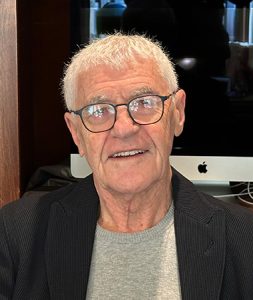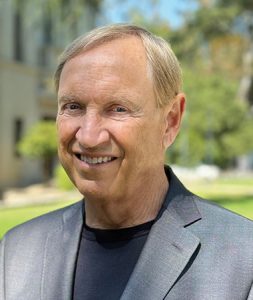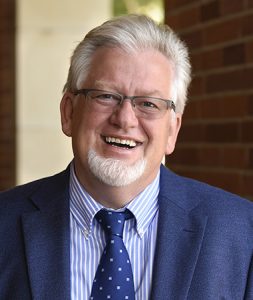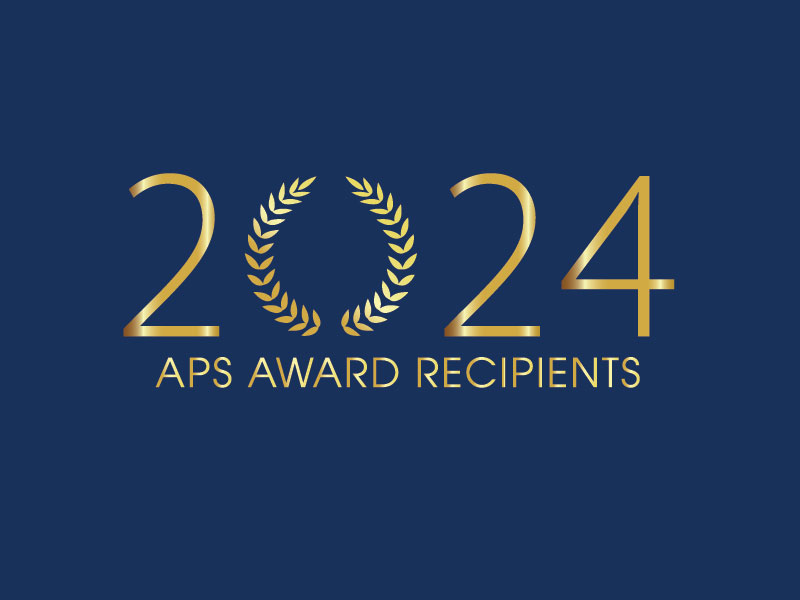APS Honors 13 Psychological Scientists With 2025 Lifetime Achievement Awards

James McKeen Cattell Fellow Award • James S. Jackson Lifetime Achievement Award for Transformative Scholarship • William James Fellow Award • Mentor Award
Trailblazers in the study of resilience, working memory, burnout, and diversity are among the 13 psychological scientists being honored with 2025 APS lifetime achievement awards.
Since APS honored the first group of William James Fellows in 1989, the program has grown to encompass four separate lifetime awards, each honoring multiple distinguished scientists for their contributions to the field. The awards will be presented in May at the 2025 APS Annual Convention in Washington, DC.
The 2025 APS Janet Taylor Spence Award for Transformative Early Career Contributions will also be presented at that time.
APS James McKeen Cattell Fellow Award
The APS James McKeen Cattell Fellow Award recognizes APS members for a lifetime of outstanding contributions to the area of applied psychological research. The committee has selected the following individuals for the 2025 award.
J. Lawrence Aber
New York University

Lawrence Aber is one of the world’s leading experts on fostering social-emotional learning and resilience among children and youth at risk. He is currently the Willner Family Professor of Psychology and Public Policy at the Steinhardt School of Culture, Education, and Human Development and University Professor at New York University, where he also serves as board chair of its Institute of Human Development and Social Change and co-director of the international research center Global TIES for Children.
In rigorous, prospective studies, Aber has demonstrated how early adversity (especially poverty and violence at multiple levels of the human ecology) leads to children’s problem behavior as mediated by social-cognitive processes. He also is known for his analysis of the impacts of innovative policies and practices on children’s academic, social, and emotional development. His collection of randomized controlled trials of social-emotional and academic learning interventions in the context of global crises represents some of his important empirical contributions. He and his collaborators have reported important findings about the impacts of these interventions in Syrian refugee settings in Lebanon and crisis settings in Niger. Aber’s exceptional work proves that rigorous psychological science and intervention trials can foster children’s well-being in conflict-torn contexts.
Eric Johnson
Columbia University

Eric Johnson has been a leader in bringing behavioral science into public policy. For almost 40 years, Johnson has studied the processes used to make everyday choices. His work has revealed the cognitive mechanisms that underlie better choices, an area known as choice architecture, informing how best to present choices to maximize desirable outcomes. The inaugural holder of the Norman Eig Chair of Business, the Founder and Director of the Center for Decision Sciences at Columbia University, and an advisor to the U.S. Consumer Financial Protection Bureau, Johnson has made important methodological and conceptual contributions to decision-making research.
He developed a method that uses a computer mouse to measure moment-by-moment changes in people’s attention as they make decisions. This method—which is easier to implement than eye tracking—is now widely used in a variety of applied domains, including research on consumer finance and food choices. His game-changing work has helped foster policies that increase organ donations and support environmentally friendly laws and regulations. Johnson has demonstrated not only how basic research can lead to valuable real-world applications, but how data from these applications can inform and enrich basic theory and research.
Christina Maslach
University of California, Berkeley

Christina Maslach pioneered research on the definition, predictors, and measurement of job burnout, an experience of exhaustion, cynicism, and inefficacy caused by chronic job stressors. She also has focused on finding interventions for burnout. A professor of psychology (Emerita) and a core researcher at the Healthy Workplaces Center at the University of California, Berkeley, she created the Maslach Burnout Inventory (MBI), the most widely used instrument for measuring job burnout. Her groundbreaking work is the basis for the World Health Organization’s 2019 decision to include burnout as an occupational phenomenon with negative health effects in the 11th Revision of the International Classification of Diseases (ICD-11).
Her research has garnered widespread recognition. Her longitudinal research on early burnout predictors was honored in 2012 as one of the 50 most outstanding articles published by the world’s 300 top management journals. In 2021, Business Insider named her one of the top 100 people transforming business. Maslach’s indispensable work cuts across health, personality, social, industrial/organizational, and clinical psychology. Her research has spurred countless scholars to investigate burnout and organizations to take steps to alleviate it.
APS James S. Jackson Lifetime Achievement Award for Transformative Scholarship
The APS James S. Jackson Lifetime Achievement Award for Transformative Scholarship honors APS members for their lifetime of outstanding psychological research that advances understanding of historically disadvantaged racial and ethnic groups and/or the understanding of the psychological and societal benefits of racial/ethnic diversity, equity, and inclusion.
Launched in 2022, this award pays tribute to the late James S. Jackson, a pioneering social psychologist known for his research on race and ethnicity, racism, and health and aging among Black Americans.
Steven Lopez
University of Southern California

A professor of psychology and social work at the University of Southern California, Steven Lopez has demonstrated a passion for studying cultural and diversity issues with a particular emphasis on individuals suffering from severe mental illness. Lopez’s research has shown how sociocultural processes can shape the way family caregiving affects the course of illness. He found, for example, that the absence of family warmth, rather than the presence of criticism, predicted relapse in Mexican Americans with schizophrenia. Lopez also has led efforts to increase mental health literacy within the Latinx community.
Using both single group and randomized controlled designs, he has demonstrated that a psychosis literacy educational program he developed for Spanish-speaking communities improves participants’ knowledge of psychotic symptoms, their ability to identify such symptoms in a hypothetical story, and the likelihood that they would recommend professional help for a given case. Lopez’s vital work has enhanced knowledge around diversity issues and has offered clear models to help reduce disparities in mental health care for minoritized communities and other disadvantaged communities.
Margaret Beale Spencer
University of Chicago

Margaret Beale Spencer is the Distinguished Service Professor, Emerita at the University of Chicago. Her momentous work has focused on the resiliency, identity, and competence formation processes of America’s diverse youth of color as well as European American youth. Spencer’s research has illuminated the emerging capacity of young people to seek healthy outcomes and constructive coping methods under generally unacknowledged and highly stressful conditions. She laid the foundation for demonstrating resilience in Black populations who face adverse systematic circumstances and the development of positive group identity in response to the aftermath of the Civil Rights movement.
In the 1990s, she developed the Phenomenological Variant of Ecological Systems Theory (PVEST), incorporating culture, development, and contextual perspectives as a framework for studying marginalized and privileged individuals. The framing guides her scholarship and provides an identity-focused cultural ecological perspective, which recognizes the universality of vulnerability as diverse humans situated both in the United States and abroad. Spencer’s work moved scholars toward conducting research that centered on African American children rather than the previous standard of White, middle-class participants. Her pivotal research continues to inform school practices and youth programs and is used widely by those serving youth across a range of settings.
APS William James Fellow Award
The APS William James Fellow Award honors APS members for their lifetime of significant intellectual contributions to the basic science of psychology.
Lisa Feldman Barrett
Northeastern University

Lisa Feldman Barrett has revolutionized the science of emotion in psychology and neuroscience. A University Distinguished Professor of Psychology at Northeastern University and past president of APS (2019-2020), Barrett holds appointments in the Departments of Psychiatry and Radiology at Massachusetts General Hospital, where she also serves as Chief Science Officer for the Center for Law, Brain & Behavior.
Barrett has contributed fundamental methodological, experimental, and theoretical innovations to our understanding of the nature of emotion. She integrates biological, social, and cultural perspectives; challenges the conventional scientific wisdom that emotions are universal patterns triggered by dedicated neural circuits; and instead quantifies emotions as flexible, relational categories filled with variety. Barrett and her collaborators study people across their lifespan in both urban and small-scale, Indigenous cultures. Her discoveries and insights have inspired psychological science and neuroscience beyond emotion and have impacted scholarship in history, philosophy, law, and engineering. Barrett is appreciated for her rigorous, creative and inclusive approach to science and for her generous and dedicated mentorship. She is also known for enthusiastically engaging with scientific adversaries in the service of scientific discovery.
See all Presidential Columns featured in the Observer by Lisa Feldman Barrett.
Randall W. Engle
Georgia Institute of Technology

Randall Engle is responsible for developing the concept of working memory into its modern form. A professor of psychology at the Georgia Institute of Technology, he was one of the first scientists to unite experimental cognitive psychology with psychometric testing and individual differences. Engle and his students reported that individual differences in working-memory capacity predicted performance on a huge number of cognitive tasks, including reading and listening comprehension, writing ability, learning complex materials, and problem solving. He developed a number of tasks to assess working memory span and gave these tasks away, putting them on his website and writing articles with his students that provided a user’s manual.
Government agencies and corporations have tapped Engle’s work in employee selection because the measures, which are strongly related to assessments of fluid intelligence, show no gender or race biases. Engle also served for a decade as editor of Current Directions in Psychological Science. Through all of this generous work, Engle integrated findings from various psychological fields to understand emotion, physical and mental health, work productivity, and social relationships.
Arie Kruglanski
University of Maryland College Park

Arie Kruglanski’s work on lay epistemics, goal systems, and significant quest theories present among the most general and elegant theoretical frameworks in social psychology. A distinguished professor at the University of Maryland College Park, he has made a major contribution to the understanding that human reasoning is a motivated social-psychological phenomenon and that motivation is a cognitive activity.
Kruglanski’s theories have inspired empirical research in various domains of psychology and have led to the development of scales that measure the need for cognitive closure and significance quest. Kruglanski has tested the applicability of his theories to a wide variety of major psychological phenomena, including persuasion, hypothesis testing, decision making, and categorization. His lab explores violent extremism, political activism, love, aggression, coping with uncertainty, and closed mindedness. His innovative research uses a variety of methods, including lab experiments, neuroscience techniques, computer modeling, text analyses, and surveys. Kruglanski’s scholarship has forever altered the landscape of motivational science.
APS Mentor Award
The APS Mentor Award honors the importance of mentoring in the field of psychological science as well as the dedication and impact of individuals with a distinguished record of teaching, advising, and encouraging students and colleagues.
William Crano • Dacher Keltner • Elizabeth A. Phelps • Norbert Schwarz • L. Monique Ward
William Crano
Claremont Graduate University

William Crano holds the title of Oskamp Chair, Distinguished Professorship in Psychology in Claremont Graduate University’s Division of Behavioral and Organizational Sciences. His basic research is concerned with social influence, especially the impact of minorities on the beliefs and actions of the majority, and on the effects of self-interest on attitudes and actions. Crano’s mentees laud him for exemplifying a standard of research that is inclusive, ethical, and focused on real-world problems. One mentee described how Crano would “inevitably step up to serve as an advisor for those students who, with just a dissertation remaining, were abandoned by their original advisors.”
Crano also is recognized for finding a point of connection to his students’ work, even when the topics sat outside his immediate areas of scientific interest. His mentees have become experts on stereotyping and prejudice, criminal justice, risky adolescent behavior, HIV/AIDS intervention, reproductive rights, health equity, drug addiction, and organ donation, as well as basic research on self-regulation, self-concept, social influence, persuasion, attitudes, and social judgment.
Dacher Keltner
University of California, Berkeley

A Distinguished Professor at the University of California, Berkeley, Dacher Keltner studies power, social class, and the social functions of emotion, showing that emotions enable individuals to respond adaptively to the problems and opportunities that define human social living. Keltner’s students say he approaches them as collaborators, fostering an atmosphere of respect and mutual learning. His mentees commend him for providing frank, constructive feedback that builds on his students’ own ideas and guides them toward developing a refined project that is still their own.
Mentees report that Keltner takes risks with students, accepting those who have switched career pursuits, taken time off to work in the Peace Corps, or traveled other unconventional paths to psychological science. His former students commend him for guiding them through a potentially overwhelming body of interdisciplinary literature in a way that is not just intellectually invigorating, but fun. He is generous with advice, data, authorship, opportunities, and credit. Keltner provides the freedom and flexibility needed for intellectual growth, and the autonomy he promotes in students builds their character as independent scholars.
Elizabeth A. Phelps
Harvard University

Elizabeth Phelps is the Pershing Square Professor of Human Neuroscience at Harvard University. Her research has uncovered the impact of emotion and affect on cognition, enhancing our understanding of cognition and providing insights into social processes and psychological disorders. Phelps encourages every student to design an independent research program and provides the resources and guidance to help their ideas take shape.
Phelps creates a lab environment where young minds feel encouraged and empowered to not only add their voices to scholarly conversations, but to also challenge existing theoretical and empirical work. She also recognizes when other expertise would benefit her mentees and facilitates collaboration whenever possible. This not only expands their science, but helps students form valuable connections. Phelps also emphasizes the importance of communicating science, ensuring that each of her mentees (including undergraduates) practices presentations for her and the rest of the lab. She has inspired scientists throughout the field through her leadership, which includes serving as APS President from 2013-2014. Many of her trainees are leaders in the field of emotion and cognition.
Norbert Schwarz
University of Southern California

Norbert Schwarz is Provost Professor of Psychology and Marketing at the University of Southern California. His research explores how people make sense of the world in which they live and how their decisions are shaped by subtle contextual influences. His mentees describe working with him as transformative, inspiring them to engage in thoughtful discussions, constructive criticism, and rigorous thinking.
In a career spanning more than 40 years, Schwarz has invested his time, instilled curiosity, nurtured confidence, and shared his compassion in supporting mentees to carve out their own careers. He creates a research environment that not only values rigorous science and deep thinking, but also creativity and fun. Schwarz takes time to support others to flourish, whether they are members of his lab, visitors, or early career academics looking for advice and new perspectives. Schwarz has helped his mentees design careers that are aligned with their own values, context, and goals.
L. Monique Ward
University of Michigan

As the Arthur F. Thurnau Professor of Psychology at the University of Michigan, L. Monique Ward leads an impactful research program that addresses children’s and adolescents’ developing conceptions of both gender and sexuality and how they receive messaging about male-female relations from their parents, peers, and the media. By attracting diverse young scholars of color and nurturing them to pursue their diverse interests, her mentoring efforts have had a deep and lasting impact on developmental psychology and related disciplines.
Ward’s students describe her hands-on, collegial leadership style as more peer-to-peer than mentor-to-student. Her mentorship strikes a delicate balance; her expectations are high, but she provides the tools, insight, and support necessary to enable her students to meet them. One mentee noted that Ward’s honesty about her own successes and failures normalized her students’ own struggles as new scholars. She is widely recognized as a champion of the career development for women, especially women of color. Many of her former students are now prominent scholars and community leaders who are helping advance the well-being of women in science and society.
Related coverage of the APS Awards Program
-

Join APS in Celebrating the 2024 APSSC Poster Award Winners
Researchers reflect on their award-winning posters featured at the APS 2024 Annual Convention.
-

2024 APS Awards Ceremony: A Celebration of Excellence
APS honors members throughout their careers with the field’s most prestigious awards and recognitions at the 2024 APS Annual Convention in San Francisco, California.
-

2024 APS Lifetime Achievement Awards Honor 15 Psychological Scientists
Scientists who have pioneered our understanding of language, vision, theory of mind, racial/ethnic identity, and much more are among the 15 recipients of APS’s highest honors.
Feedback on this article? Email [email protected] or login to comment.





APS regularly opens certain online articles for discussion on our website. Effective February 2021, you must be a logged-in APS member to post comments. By posting a comment, you agree to our Community Guidelines and the display of your profile information, including your name and affiliation. Any opinions, findings, conclusions, or recommendations present in article comments are those of the writers and do not necessarily reflect the views of APS or the article’s author. For more information, please see our Community Guidelines.
Please login with your APS account to comment.